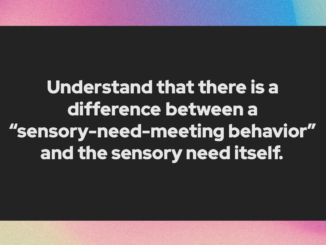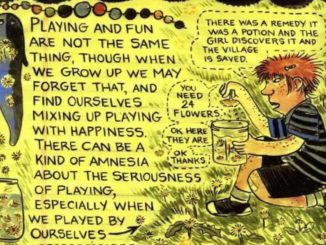This post has an audio and video recorded version for those who prefer to learn by hearing rather than by reading. Scroll to the bottom for the video of me reading it.
You know, one thing that I notice is a pattern with most adults (me included) is that they might notice patterns with their kids and yet, for some reason, feel like they can’t overtly name or describe that pattern.
One example was a parent who noticed that their anxious pre-teen was asking the same question over and over. The parent was pretty sure that the underlying reason was the child’s anxiety. They were getting frustrated with answering the same questions again and again, as it made the parent feel like they weren’t being listened to, but they also didn’t like it when they would snap and tell the child to stop asking the same questions over and over again, or say, “I already answered you.”
Why not just overtly say… “Are you feeling anxious about that? You’ve already asked me a couple of times. We can totally talk about it if you want. I’m here for you.”
Or, “It feels to me like you didn’t like the answer I gave you a minute ago. Am I on the right track? I don’t have a different answer now, bud. But if there’s something I can do to help, I will. We can talk about it if you’d like.”
Another example was a parent who noticed that their child said “I’m bored” specifically when the child was hoping to hint that they wanted more screen time. The parent had noticed the pattern and was annoyed with it, and would always respond with the same types of prompts about what the child could do with their time instead.
But they weren’t overtly discussing why they were doing that. The child was saying, “I’m bored,” meaning, “I wish you would offer me more screen time.”
And the parent was understanding the underlying subtext, and replying, “Why don’t you go do X,” but never actually addressing the subtext, or saying out loud that both parties were aware of the subtext.
(Or maybe both parties weren’t aware of the subtext! Maybe the child did always mean “I wish you would offer me more screen time,” but didn’t know that that’s what they meant, or hadn’t noticed the pattern themselves.)
What if the child said, “I’m bored,” and the parent said, “You know, I’ve noticed that you usually feel bored when you wish you had more screen time,” without feeling like they have to have already solved the problem or decided what the kid’s going to do about it.
Just to see where the conversation goes.
I had a student in OT with me who would frequently go out of their way to talk about how “dumb” and “stupid” they were. I didn’t know 100% of the things going on in this child’s life, but I knew with a high degree of certainty that they were not getting this language from anyone at school — they were generally beloved by other students, they had the most supportive teacher anyone could possibly have hoped for, etc. I even knew their parents and although of course it’s not possible to know everything about a child’s home life, I didn’t suspect that it was coming from there either. (I also knew that this student used the internet quite a lot more fluently than I wished they would for their age, and I suspected these words and some other harsher words they frequently used could have originated from there.) (I say all of this to explain that I did due diligence in checking in with various people in this child’s life, and I didn’t have any red flags raised beyond that about some kind of ongoing bullying, verbal abuse, etc I needed to intervene in.)
At first I would sometimes reply like I thought the student wanted me to reply: “You know, I don’t think you’re stupid.” I thought maybe it was an anxiety and hoping for reassurance type of thing, and I was in a position to provide that reassurance, so I did.
After some time of knowing the student and getting to know them more in depth, I once said instead, “I think it makes people feel pretty uncomfortable when they hear you say you’re stupid. Adults try to be like, ‘You’re not stupid, you’re smart!’ And also, I wonder if you might know that it makes people uncomfortable, but it still feels important to you to say it anyway for some reason. But I can’t quite tell what reason why.” And then we had a super in depth conversation about their self-esteem and several philosophical thoughts on the world that they had, and their definition of the words and what it meant for them to be intentionally calling themself by a provocative term. And it felt really important and profound for them to work on expressing out in words to me.
(I trust that people will have a lot of emotions about this example. It’s big, and intense, and full of a lot of things that could bring up your own emotions from your own childhood, or from a child you know. And I ask you to trust me that even as I share a sliver of this other child’s story, that I keep back some of their story because it’s not mine to tell nor is this the platform to do it, and that I continued to work with and care for and care about them. ❤ )
These examples are full of a lot of words, and probably make the most sense for pre-teens and up; of course, you could adjust how many words you were using to try to fit the processing level of the child you’re talking to. This feels, to me, like it’s the next logical step in helping younger children learn to name what emotion is underneath their non-literal language. If a four-year-old says “You’re NOT invited to my birthday party,” we can both understand that what they’re expressing is “I’m angry,” and maybe if the situation is right we can even share with them: “I can tell you’re super angry about this.”
Then those kids get older, and their social skills become more mature and refined (if still immature by adult standards), and they figure out how to hint at things or when they might need to hide their desires or how to try to ask carefully without getting let down or all kinds of other complicated social skills, and they try them in still-immature ways. And sometimes it makes sense to step into that framework and talk from within that framework. But sometimes it also makes sense to step outside the framework, and point at it, and explain what it is, so that they at least have an understanding of what they’re doing, and maybe a more productive conversation overall.



